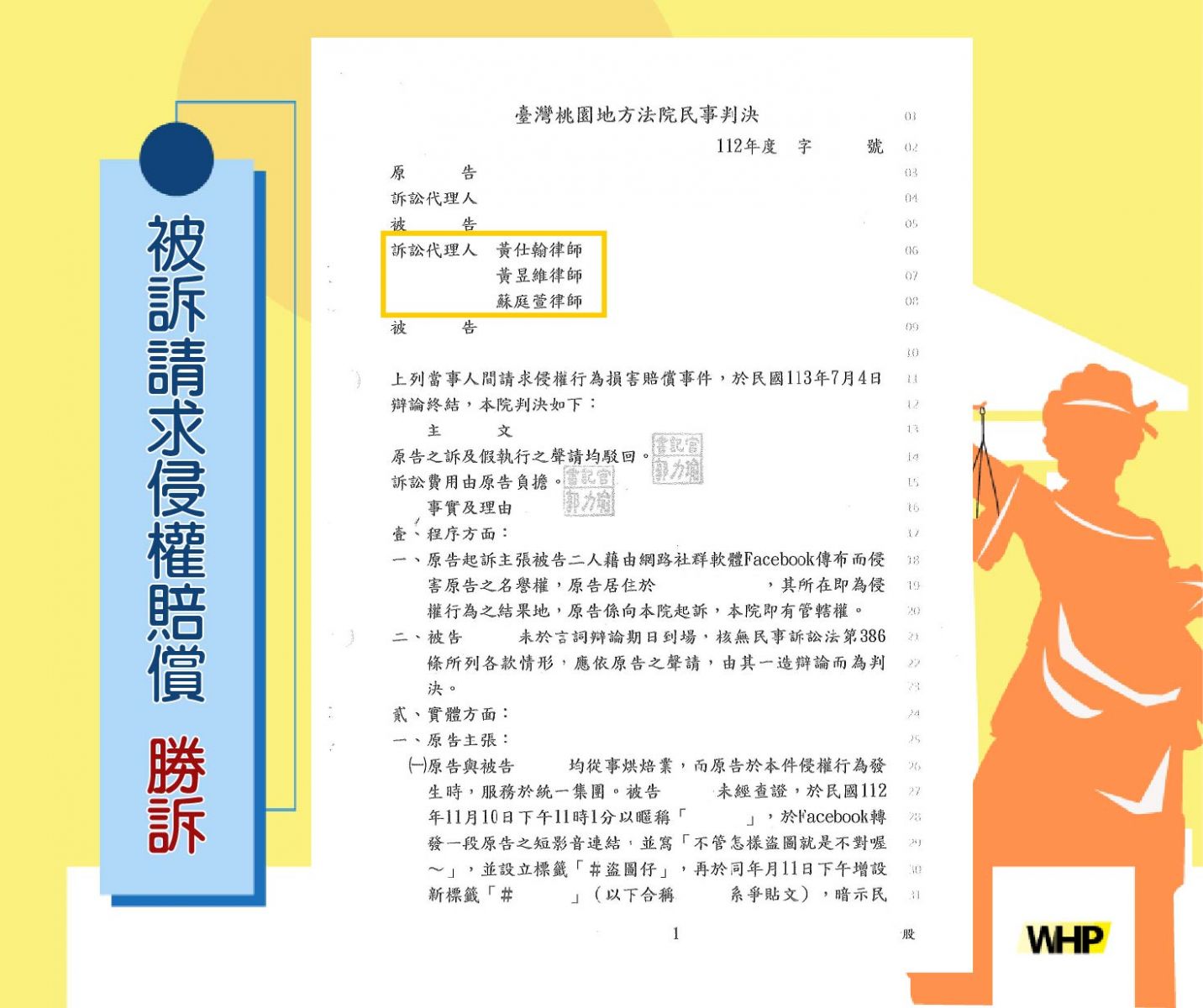首頁 >
| Civil Tort Case | Defendant Won the Claim for Damages Due to Alleged Infringement

Relevant Legal Provisions
Interpretation No. 509 by the Constitutional Court of the Judicial Yuan states:
"Freedom of speech is a fundamental right of the people, expressly guaranteed by Article 11 of the Constitution. The state should provide the maximum protection to ensure that it functions in facilitating self-expression, exchanging opinions, pursuing truth, and overseeing political or social activities. However, to balance the protection of personal reputation, privacy, and public interest, the law is allowed to impose reasonable restrictions on the manner in which freedom of speech is exercised. Article 310, Paragraphs 1 and 2 of the Criminal Code on defamation were enacted to protect individual rights and prevent the infringement of others’ freedoms, aligning with the intent of Article 23 of the Constitution. As for the first part of Paragraph 3 of the same Article, which exempts punishment for defamation if the defamatory statements can be proven true, it is meant to safeguard speech that corresponds with the truth and limit the scope of criminal sanctions. This does not mean that the person making or transmitting the defamatory statements must personally prove the truth of their claims to avoid criminal liability. However, if the speaker cannot prove that their statements are true but has sufficient reason to believe in their truth based on the evidence provided, they shall not be held criminally liable for defamation. At the same time, this provision does not exempt the prosecutor or private accuser from bearing the burden of proving the speaker’s intent to maliciously damage someone’s reputation, nor does it relieve the court from the obligation to ascertain the truth. In this regard, Paragraph 3 of Article 310 of the Criminal Code does not conflict with the constitutional protection of freedom of speech."
Facts and Reasoning
The defendant, a client of our law firm, was accused of defamation and faced a damages claim for allegedly infringing upon the reputation of the plaintiff. The dispute arose when the plaintiff used the defendant’s commercial images and related information without consent. After an attempt to resolve the issue through communication with the plaintiff, the defendant left a comment on the plaintiff's public forum, stating that the plaintiff had misappropriated the images. Subsequently, the plaintiff sued for defamation and claimed damages.
(Note: To protect the client's interests, certain case details and judgment images have been redacted and modified. For a full review of the case, please refer to the Judicial Yuan’s judgment database.)
Judgment
Thanks to the vigorous efforts of our attorneys, the court ruled that the plaintiff had indeed used the defendant’s images without consent, which is an objective fact, not a fabricated statement. The defendant had sufficient reason to believe in the truthfulness of their remarks, and there was no malicious intent or gross negligence in creating false facts. Furthermore, the accuracy of the information provided in the plaintiff’s advertisement is relevant to consumer interests. Therefore, the defendant's opinion, expressed as "stealing images is wrong," was a legitimate commentary on a matter open to public scrutiny, based on the defendant’s legal rights as the creator of the images. The plaintiff failed to provide sufficient evidence to prove that the defendant acted with intent or negligence to unlawfully damage the plaintiff's reputation. Thus, the defendant was not liable for defamation or for unlawfully infringing upon the plaintiff's reputation rights.
The plaintiff’s claim was dismissed.
Attorneys:Huang Shih-Han, Attorney-at-Law、Huang Yu-Wei, Attorney-at-Law、Su Ting-Hsuan, Attorney-at-Law
-
03.25 2025
Successful acquittal of lawyer's dummy account def...
-
03.18 2025
Divorce | Claim for Distribution of Remaining Prop...
-
03.11 2025
Criminal Second Instance | Report of Winning a Law...
-
02.25 2025
Civil | Second-instance case of demolition and lan...
-
02.18 2025
Car Accident | Volunteer Traffic Officer Hit by Ca...
-
02.11 2025
Car Accident | Our Lawyer Successfully Assisted th...
-
02.04 2025
Traffic Accident | Lawsuit for Serious Injury Succ...
-
01.21 2025
Fraud | Dummy Account Defendant Successfully Obtai...
-
01.14 2025
Criminal and Civil | Our Lawyer Successfully Helpe...
-
01.07 2025
Obstruction of Sexual Autonomy | Accused of Taking...
-
12.31 2024
Civil Case | Claim for Compensation Adjustment, Vi...
-
12.24 2024
Defamation | Uploading Photos to a Gossip Forum Le...
-
12.17 2024
Civil Case | False Claims in Assignment of Debt: V...
-
12.10 2024
Sexual Harassment | Defendant Not Prosecuted for S...
-
12.03 2024
Breach of Trust | Defendant Successfully Acquitted...